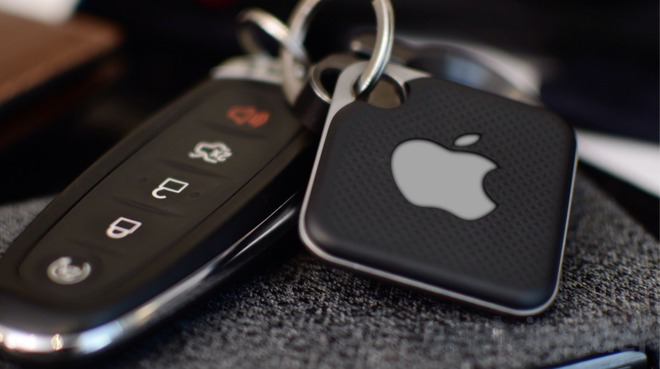Apple scrutinized for 'Find My' restrictions placed on third-party developers
Apple will soon widen its "Find My" feature to allow third-party devices to be tracked, but not without a concerning number of restrictions, according to some developers.

In iOS 14, Apple will launch a new Find My network accessory program, which allows Apple customers to track third-party items, like object trackers such as Tile or any other devices that can be integrated into the platform.
However, it appears that third-party companies will have to adhere to far more stringent rules if they want to take advantage of Find My.
An anonymous developer shared a copy of an Apple document that detailed the rules they were expected to follow with The Washington Post. The document, which totaled 50 pages, details how customers will be able to interact with Find My.
The first major limitation is that users will not be able to use competing services while using Find My. Developers told The Post that this is not something they have encountered before. Apple users are usually afforded the ability to use multiple apps to control the same piece of hardware.
Developers will also be required to ask a user for consent before obtaining their location, which is essential for tracking items. This is a hindrance for third-party trackers like Tile.
Another hurdle for developers is their limited access to the Bluetooth antenna within the iPhone. While Find My can use Bluetooth whenever needed, third-party software can only use it conditionally.
Developers were also expected to sign a document entitled "Limited License to Find My Network Accessory Spec," which prevented them from going public with Apple's new Find My criteria. An anonymous developer shared the details of the document with The Post, pointing out that the confidentiality agreement was notably more strict than the ones they'd seen in the past.
The limitations Apple has set forth may be seen as another case of Apple engaging in anticompetitive behavior. Apple has faced numerous antitrust probes in recent years.
In June, the Department of Justice and state attorneys general prepared to launch an antitrust investigation into Apple's App Store after developers continue to raise concerns over anticompetitive behavior.
On July 16, European Union announced its plans on gathering information from over 400 companies to see if companies like Apple and Amazon are using voice assistants Siri and Alexa to engage in anticompetitive behavior.
In iOS 14, Apple will launch a new Find My network accessory program, which allows Apple customers to track third-party items, like object trackers such as Tile or any other devices that can be integrated into the platform.
However, it appears that third-party companies will have to adhere to far more stringent rules if they want to take advantage of Find My.
An anonymous developer shared a copy of an Apple document that detailed the rules they were expected to follow with The Washington Post. The document, which totaled 50 pages, details how customers will be able to interact with Find My.
The first major limitation is that users will not be able to use competing services while using Find My. Developers told The Post that this is not something they have encountered before. Apple users are usually afforded the ability to use multiple apps to control the same piece of hardware.
Developers will also be required to ask a user for consent before obtaining their location, which is essential for tracking items. This is a hindrance for third-party trackers like Tile.
Another hurdle for developers is their limited access to the Bluetooth antenna within the iPhone. While Find My can use Bluetooth whenever needed, third-party software can only use it conditionally.
Developers were also expected to sign a document entitled "Limited License to Find My Network Accessory Spec," which prevented them from going public with Apple's new Find My criteria. An anonymous developer shared the details of the document with The Post, pointing out that the confidentiality agreement was notably more strict than the ones they'd seen in the past.
The limitations Apple has set forth may be seen as another case of Apple engaging in anticompetitive behavior. Apple has faced numerous antitrust probes in recent years.
In June, the Department of Justice and state attorneys general prepared to launch an antitrust investigation into Apple's App Store after developers continue to raise concerns over anticompetitive behavior.
On July 16, European Union announced its plans on gathering information from over 400 companies to see if companies like Apple and Amazon are using voice assistants Siri and Alexa to engage in anticompetitive behavior.

Comments
To the developer who felt so offended he/she leaked the document to the press, not cool! I hope Apple finds out who you are and bans you from the platform.
At first I thought it meant that developers couldn’t support another service if they wanted to use the Find My service.
Or maybe tag manufacturers register their Bluetooth OUI with Apple (or on the phone) which lets it work with Find My, but Bluetooth endpoints which match Find My won't show up in other applications at all.
Or maybe the tag will need firmware changes and Apple is saying they don't allow tag firmware which works with Find My and with other services.
Or maybe whichever service was launched most recently gets the radio and the others don't get any information (so no background indication of seeing other platforms' tags).
Could mean a number of things. Unfortunately, without the detailed specification, we can't tell which.
Poof all of your credibility is gone.
Developers are upset that Apple is holding them to tight standards as to what they can and can't do with this feature. It's almost like they don't trust them.
We find out about it because one of the developers violates their NDA and leaks the agreement.
Guess Apple is right to not trust these people.
Scrutinizing the history of developers....
Paranoid about stalker law suits...
via developers selling information to business partners.